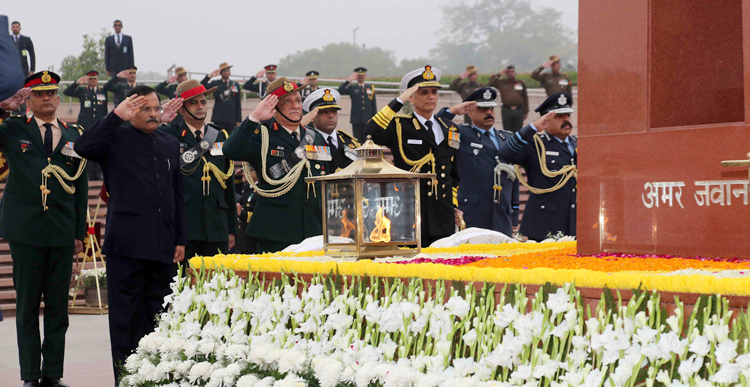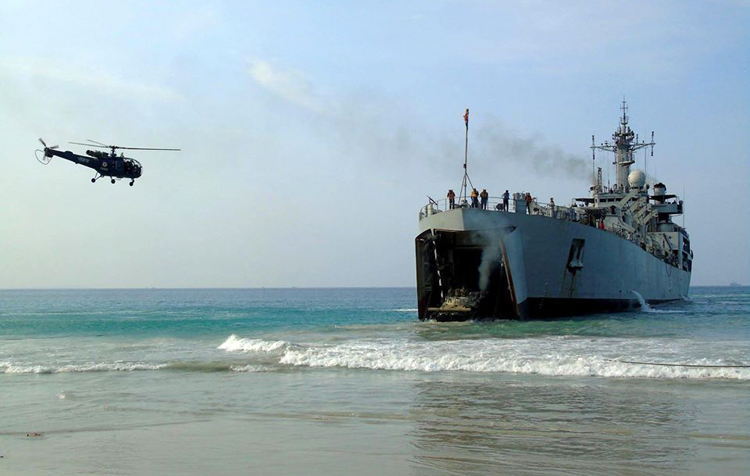INDIAN ARMED FORCES CHIEFS ON
OUR RELENTLESS AND FOCUSED PUBLISHING EFFORTS

SP Guide Publications puts forth a well compiled articulation of issues, pursuits and accomplishments of the Indian Army, over the years

I am confident that SP Guide Publications would continue to inform, inspire and influence.

My compliments to SP Guide Publications for informative and credible reportage on contemporary aerospace issues over the past six decades.
- Interim Defence Budget 2024-25 — An Analysis
- Union Defence budget 2024
- Indian Army: In quest of greater firepower and policy recommendations for gaps
- Indian Army Annual Press Conference 2024
- 6G will transform military-industrial applications
- Tata Boeing Aerospace Delivers 250 AH-64 Apache Fuselages, Manufactured in India
Cabinet approves creation of the apex military post of Chief of Defence Staff
Top military officer will head the new Department of Military Affairs but not given any command or financial powers

The Union Cabinet on December 24 approved the creation of the post of Chief of Defence Staff (CDS) as the principal military adviser to the Government, and a concomitant re-structuring of the Defence establishment which includes the creation of a new Department of Military Affairs.
The decision to create the apex post of CDS for integrated functioning of the three services was announced by Prime Minister Narendra Modi in his Independence Day Speech on August 15.
This marks the implementation of the biggest reform in India's higher defence managment, as recommended by the Kargil Review Committee and subsequently by the Group of Ministers on the revamp of national security after the Kargil War.
While the decision to appoint a CDS is historic, the charter of roles and responsibilities approved by the Cabinet do not vest the CDS with any command authority or financial powers and restricts his ambit to promoting jointness in procurements, training and staffing among the three Services
This sets the stage for the appointment of India's first CDS, a four-star officer who will head the new Department of Military Affairs. The Indian Army, Navy and Air Force will administratively be brought under the ambit of the Department of Military Affairs, which will be the fifth department under the Ministry of Defence.
While the decision to appoint a CDS is historic, the charter of roles and responsibilities approved by the Cabinet do not vest the CDS with any command authority or financial powers and restricts his ambit to promoting jointness in procurements, training and staffing among the three Services.
While the approved charter of roles and responsibilities for the CDS place him as the "Principal Military Advisor to Raksha Mantri (Defence Minister) on tri-service matters, it also makes it clear that the "CDS will not exercise any military command, including over the three Service Chiefs".
"The three Chiefs will continue to advise RM (Defence Minister) on matters exclusively concerning their respective Services," the charter caveats.
The meat of the role of the CDS appears to be in integrating the procurements of the three services, assigning inter-service priority to capital acquisitions, and hence, determining the respective acquisition budgets for the three services
Interestingly, the CDS will not exercise command over even tri-service organisations like the Strategic Forces Command and the Andaman and Nicobar Command, a power which so far has been vested in the Permanent Chairman Chiefs of Staff Committee, which comprised the apex of military jointness and integration. This post has been generally held by the senior-most Service Chief, concurrently with the command of his individual service
The role of the Permanent Chairman Chiefs of Staff Committee has been vested in the new office of CDS, minus operational command over Tri-Service organisations.
"CDS will also have a second role. He will be the Permanent Chairman of the Chiefs of Staff Committee. In this role, he will be supported by the Integrated Defence Staff.

"CDS will adminster tri-service organisations. Their military command will be with the Chief of the duly notified Service, which has a predominant role in effective functioning of that specific tri-service organisation. However, tri-services agencies/organisations/commands related to Cyber and Space will eb under the command of CDS," the charter states.
The meat of the role of the CDS appears to be in integrating the procurements of the three services, assigning inter-service priority to capital acquisitions, and hence, determining the respective acquisition budgets for the three services.
The separate five-year Service Capital Acquisition Plans (SCAP) for the three services will now be clubbed under the Five-Year Defence Capital Acquisition Plan (DCAP) which will flow into the Integrated Capability Development Plan (ICDP).
Points 10 and 11 of the Charter of Roles Responsibility gives the CDS the mandate to "Implement Five-Year Defence Capital Acquisition Plan (DCAP), and Two-Year roll-on Annual Acquisition Plans (AAP), as a follow-up of Integrated Capability Development Plan (ICDP)"; and "Assign inter-Services prioritization to capital acquisition proposals based on the anticipated budget".
Points 10 and 11 of the Charter of Roles Responsibility gives the CDS the mandate to "Implement Five-Year Defence Capital Acquisition Plan (DCAP), and Two-Year roll-on Annual Acquisition Plans (AAP), as a follow-up of Integrated Capability Development Plan (ICDP)"; and "Assign inter-Services prioritization to capital acquisition proposals based on the anticipated budget".
The CDS will be a member of Defence Acquisition Council and Defence Planning Committee, and has been tasked with promoting the Make in India agenda and procurement of indigenous military equipment.
Significantly, the charter does not mandate any financial powers to the CDS nor states that his advice on tri-service matters will be binding, with the three Service Chiefs continuing to have sanction to render individual service advice to the Government.
Also, while the CDS is envisaged to play a key role in determining the inter-service priority of procurements, the responsibility for making the procurements will continue to vest in the Department of Defence, with some of its powers delegated to individual Service Headquarters.
"Work exclusively pertaining to Military matters will fall within the purview of the Department of Military Affairs, while the Department of Defence will deal with larger issues pertaining to defence of the country," it has been stated.
"The three Chiefs will continue to advise RM (Defence Minister) on matters exclusively concerning their respective Services," the charter caveats
The office of the CDS has been assigned the task of bringing about "jointness in operations, logistics, transport, training, support services, communications, repairs and maintenance, etc. of the three Services within three years of the first CDS assuming office". The office will also ensure optimal utilization of infrastructure and rationalisation.
There is a nebulous tasking to the Department of Military Affairs under the CDS to restructure military commands across the Services while the command function stays exclusively with the Services.
"The department will promote Facilitate restructuring of military commands for optimal utilisation of resources by bringing about jointness in operations, including through establishment of joint/ theatre commands," it is stated.
The set up under the CDS will also "Evaluate plans for 'Out of Area Contingencies', as well other contingencies such as Humanitarian Assistance and Disaster Relief".
The apex military post will come with the caveat that the appointee will be ineligible to hold any Government office after demitting the office of CDS, and that he can seek no private employment for a period of five years after demitting office without the approval of the Government.





